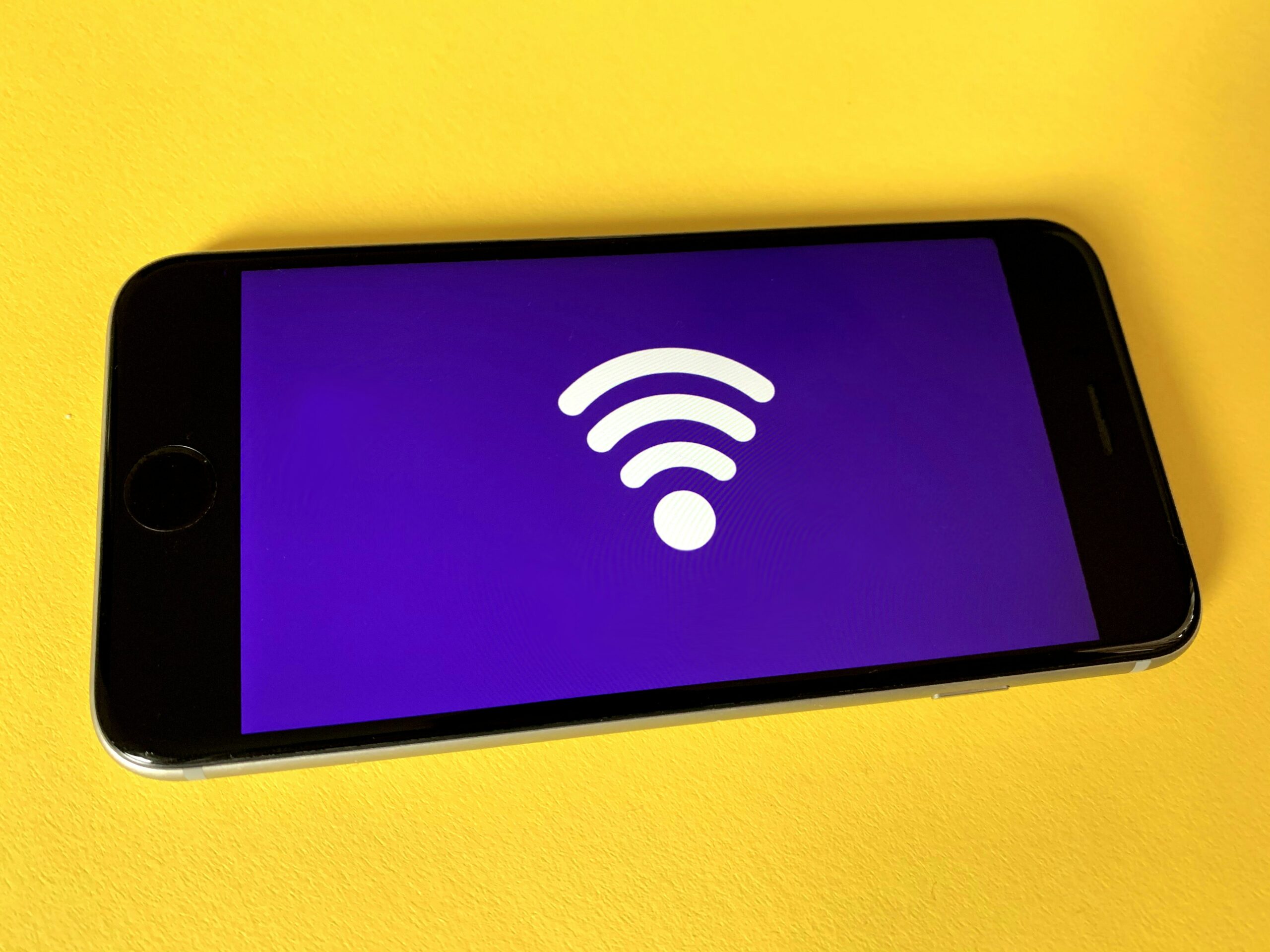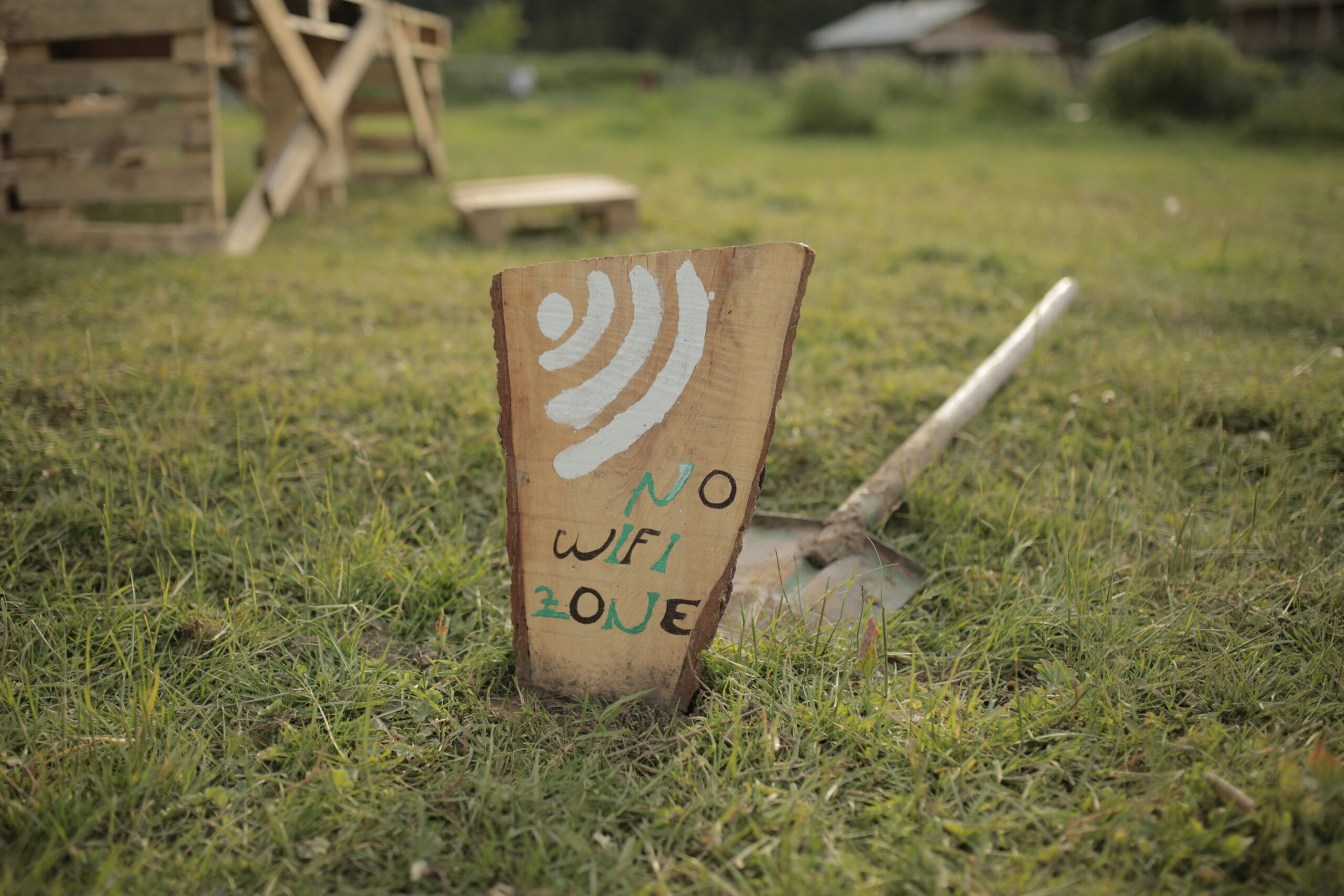Kind of four-in-ten American citizens have skilled on-line harassment, with part of this staff mentioning politics as the explanation they believe they have been focused. Rising stocks face extra critical on-line abuse comparable to sexual harassment or stalking
Contents
- 1 Kind of four-in-ten American citizens have skilled on-line harassment, with part of this staff mentioning politics as the explanation they believe they have been focused. Rising stocks face extra critical on-line abuse comparable to sexual harassment or stalking
- 2 Defining on-line harassment
- 3 41% of U.S. adults have in my opinion skilled on-line harassment, and 25% have skilled extra critical harassment
- 4 A majority of more youthful adults have encountered harassment on-line
- 5 One-in-five adults document being pressured on-line for his or her political opinions
- 6 Maximum on-line harassment goals say their most up-to-date enjoy befell on social media
- 7 Maximum American citizens are crucial of ways social media firms deal with on-line harassment; just a minority say customers will have to be capable to dangle websites legally accountable
Pew Analysis Heart has a historical past of finding out on-line harassment. This document makes a speciality of American adults’ stories and attitudes associated with on-line harassment. For this research, we surveyed 10,093 U.S. adults from Sept. 8 to 13, 2020. Everybody who took phase is a member of the Heart’s American Tendencies Panel (ATP), an internet survey panel this is recruited via nationwide, random sampling of residential addresses. This fashion just about all U.S. adults have a possibility of variety. The survey is weighted to be consultant of the U.S. grownup inhabitants by way of gender, race, ethnicity, partisan association, training and different classes. Learn extra in regards to the ATP’s method. Listed here are the questions used for this document, in conjunction with responses, and its method.
Tales about on-line harassment have captured headlines for years. Past the worse instances of sustained, competitive abuse that make the scoop, name-calling and belittling, derisive feedback have come to symbolize what number of view discourse on-line – particularly within the political realm.
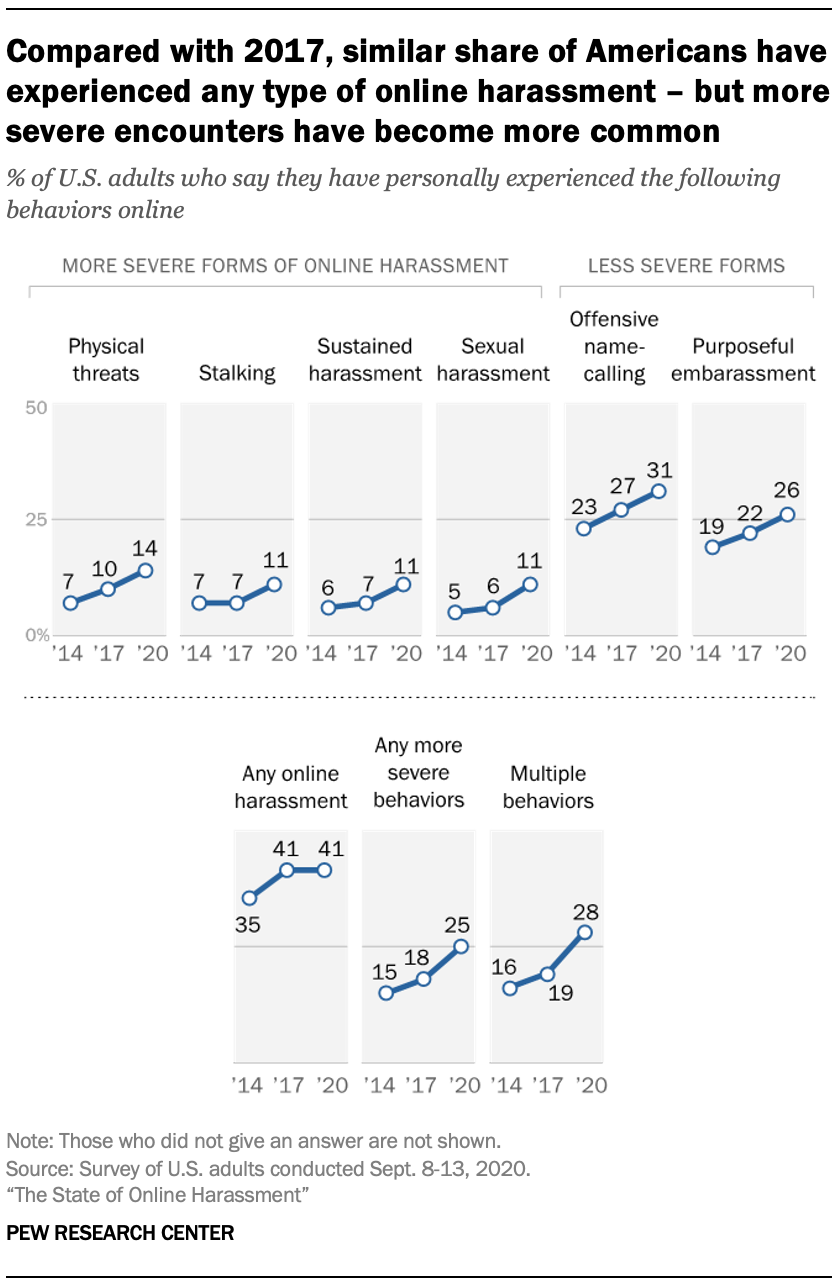
A Pew Analysis Heart survey of U.S. adults in September unearths that 41% of American citizens have in my opinion skilled some type of on-line harassment in a minimum of one of the most six key ways in which have been measured. And whilst the total incidence of this kind of abuse is equal to it used to be in 2017, there’s proof that on-line harassment has intensified since then.
First of all, rising stocks of American citizens document experiencing extra critical sorts of harassment, which encompasses bodily threats, stalking, sexual harassment and sustained harassment. Some 15% skilled such issues in 2014 and a somewhat higher proportion (18%) stated the similar in 2017. That staff has risen to twenty-five% these days. Moreover, those that were the objective of on-line abuse are much more likely these days than in 2017 to document that their most up-to-date enjoy concerned extra various varieties and extra critical sorts of on-line abuse.
In a political surroundings the place American citizens are stressed out and pissed off and antipathy has grown, on-line venues ceaselessly function platforms for extremely contentious and even extraordinarily offensive political debate. And for many who have skilled on-line abuse, politics is cited as the highest explanation why for why they believe they have been focused.
Defining on-line harassment
This document measures on-line harassment the use of six distinct behaviors:
- Offensive name-calling
- Useful embarrassment
- Stalking
- Bodily threats
- Harassment over a sustained time period
- Sexual harassment
Respondents who point out they’ve in my opinion skilled any of those behaviors on-line are regarded as goals of on-line harassment on this document. Additional, this document distinguishes between “extra critical” and “much less critical” sorts of on-line harassment. Those that have best skilled name-calling or efforts to embarrass them are classified within the “much less critical” staff, whilst those that have skilled any stalking, bodily threats, sustained harassment or sexual harassment are classified within the “extra critical” staff.
Certainly, 20% of American citizens general – representing part of those that were pressured on-line – say they’ve skilled on-line harassment as a result of their political opinions. It is a notable build up from 3 years in the past, when 14% of all American citizens stated that they had been focused because of this. Past politics, extra additionally cite their gender or their racial and ethnic background as the explanation why they consider they have been pressured on-line.
Whilst these kind of adverse encounters would possibly happen any place on-line, social media is by way of a long way the commonest venue cited for harassment – a trend constant around the Heart’s paintings through the years in this subject. The newest survey unearths that 75% of goals of on-line abuse – equaling 31% of American citizens general – say their most up-to-date enjoy used to be on social media.
As on-line harassment permeates social media, the general public is extremely crucial of the best way those firms are tackling the problem. Totally 79% say social media firms are doing an best truthful or deficient task at addressing on-line harassment or bullying on their platforms.
However whilst social media firms obtain low rankings for dealing with abuse on their websites, a minority of American citizens again the theory of preserving those platforms legally chargeable for harassment that occurs on their websites. Simply 33% of American citizens say that individuals who have skilled harassment or bullying on social media websites will have to be capable to sue the platforms on which it befell.
Those are one of the most key findings from a nationally consultant survey of 10,093 U.S. adults carried out on-line Sept. 8 to 13, 2020, the use of Pew Analysis Heart’s American Tendencies Panel. The next are a number of the main findings.
41% of U.S. adults have in my opinion skilled on-line harassment, and 25% have skilled extra critical harassment
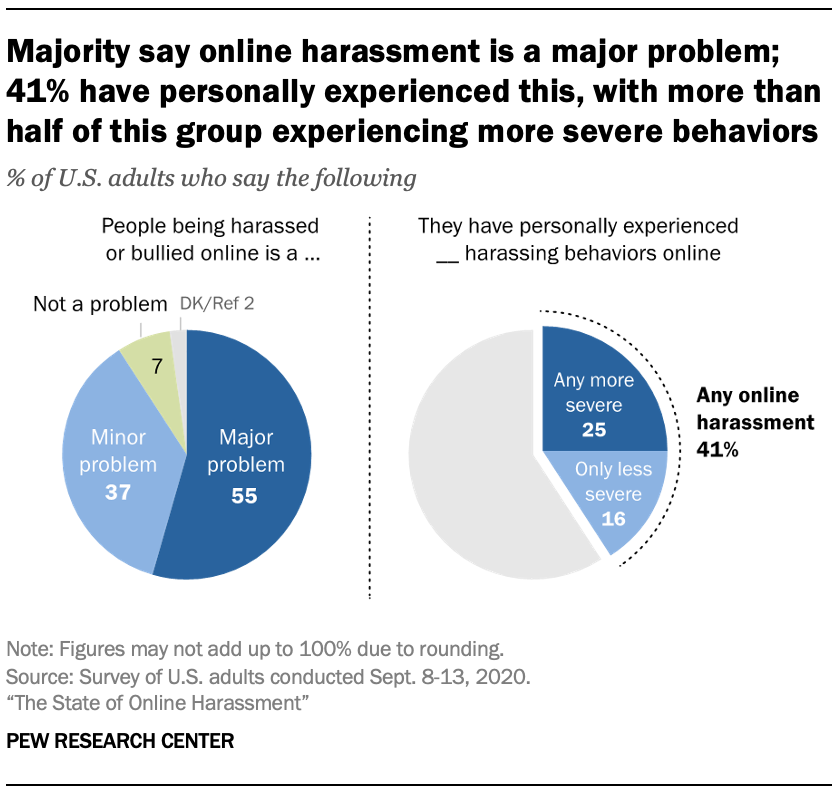
On a large stage, American citizens agree that on-line harassment is an issue plaguing virtual areas. Kind of nine-in-ten American citizens say folks being pressured or bullied on-line is an issue, together with 55% who believe it a significant issue.
Many American citizens have additionally had their very own enjoy with being focused on-line. Whilst about four-in-ten American citizens (41%) have skilled some type of on-line harassment, rising stocks have confronted extra critical and a couple of sorts of harassment. As an example, in 2014, 15% of American citizens stated that they had been subjected to extra critical sorts of on-line harassment. That proportion is now 25%. There has additionally been a double-digit build up in the ones experiencing a couple of forms of on-line abuse – emerging from 16% to twenty-eight% since 2014. This quantity could also be up since 2017, when 19% of American citizens had skilled a couple of sorts of harassing behaviors on-line.
Many person forms of behaviors are on the upward thrust as neatly. The stocks of American citizens who say they’ve been known as an offensive call, purposefully embarrassed or bodily threatened whilst on-line have all risen since 2014. Then again, the percentage who’ve skilled any of the fewer critical behaviors is in large part on par with that of 2017 (37% in 2020 vs. 36% in 2017).
A majority of more youthful adults have encountered harassment on-line
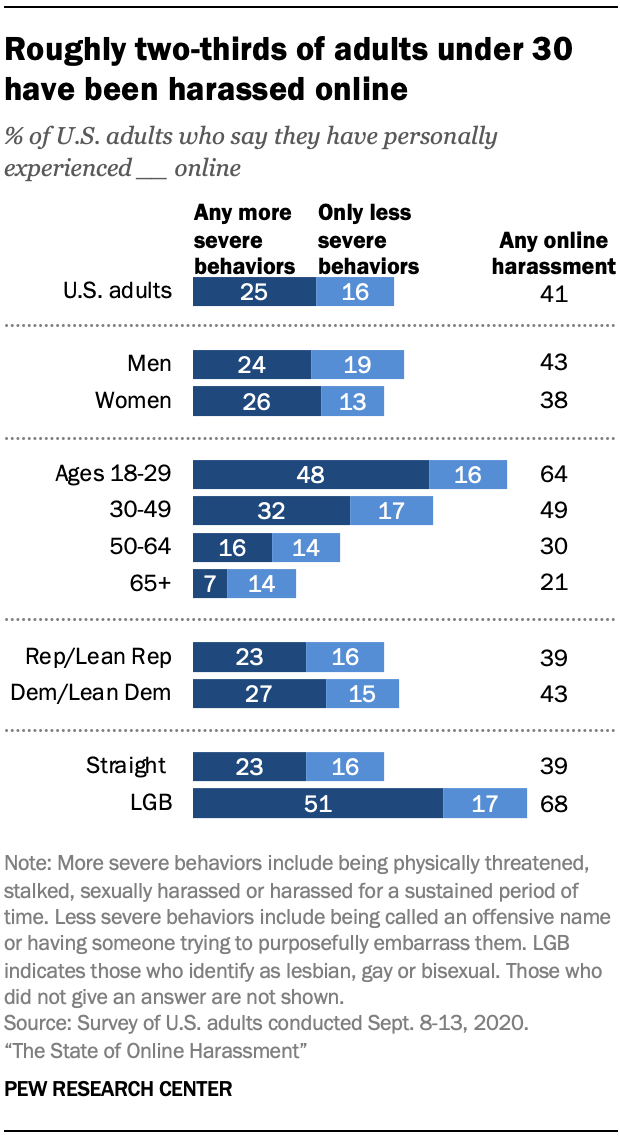
On-line harassment is a specifically not unusual characteristic of on-line lifestyles for more youthful adults, and they’re particularly at risk of going through harassing behaviors which can be extra severe. Kind of two-thirds of adults beneath 30 (64%) have skilled any type of the net harassment actions measured on this survey – making this the one age staff wherein a majority were subjected to those behaviors. Nonetheless, about part of 30- to 49-year-olds were the objective of on-line harassment, whilst smaller stocks of the ones ages 50 and older (26%) have encountered a minimum of any such harassing actions.
A an identical trend is provide when having a look at those that have confronted extra critical sorts of on-line abuse: 48% of 18- to 29-year-olds were focused on-line with extra critical behaviors, when put next with 32% of the ones ages 30 to 49 and simply 12% of the ones 50 and older.
Gender additionally performs a task within the forms of harassment persons are more likely to come across on-line. General, males are reasonably much more likely than ladies to mention they’ve skilled any type of harassment on-line (43% vs. 38%), however an identical stocks of women and men have confronted extra critical sorts of this type of abuse. There also are variations throughout person forms of on-line harassment within the forms of adverse incidents they’ve in my opinion encountered on-line. Some 35% of guys say they’ve been known as an offensive call as opposed to 26% of ladies, and being bodily threatened on-line is extra not unusual incidence for males somewhat than ladies (16% vs. 11%).
Ladies, then again, are much more likely than males to document having been sexually pressured on-line (16% vs. 5%) or stalked (13% vs. 9%). Younger ladies are specifically more likely to have skilled sexual harassment on-line. Totally 33% of ladies beneath 35 say they’ve been sexually pressured on-line, whilst 11% of guys beneath 35 say the similar.
Lesbian, homosexual or bisexual adults are specifically more likely to face harassment on-line. Kind of seven-in-ten have encountered any harassment on-line and completely 51% were focused for extra critical sorts of on-line abuse. Via comparability, about four-in-ten directly adults have persisted any type of harassment on-line, and best 23% have passed through any of the worse behaviors.
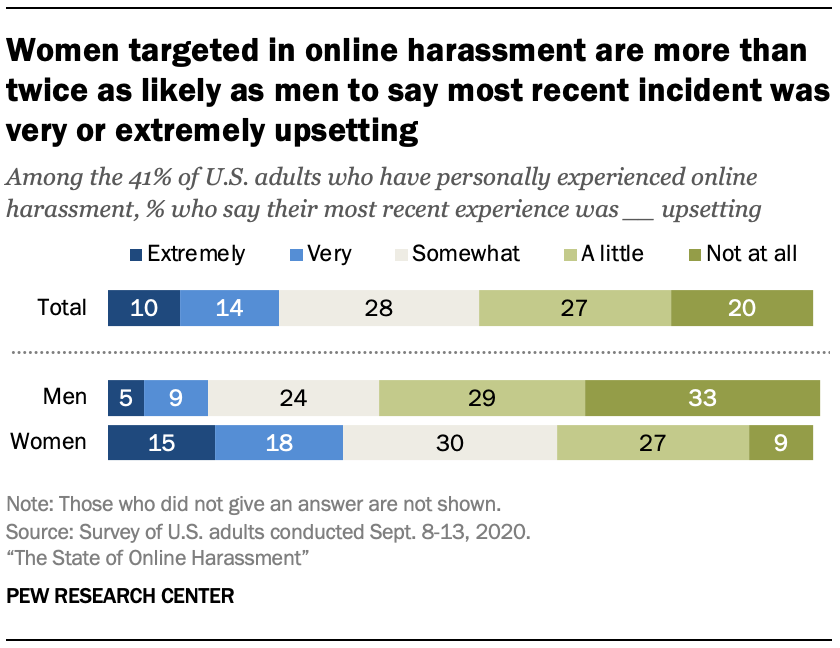
Whilst males are reasonably much more likely than ladies to enjoy harassment on-line, ladies are much more likely to be disenchanted about it and suppose this can be a significant issue. Some 61% of ladies say on-line harassment is a significant issue, whilst 48% of guys agree. As well as, ladies who’ve been pressured on-line are greater than two times as most likely as males to mention they have been extraordinarily or very disenchanted by way of their most up-to-date come across (34% vs. 14%). Conversely, 61% of guys who’ve been pressured on-line say they have been certainly not or a little bit disenchanted by way of their most up-to-date incident, whilst 36% of ladies stated the similar. General, 24% of those that have skilled on-line harassment say that their most up-to-date incident used to be extraordinarily (10%) or very (14%) scary.
One-in-five adults document being pressured on-line for his or her political opinions
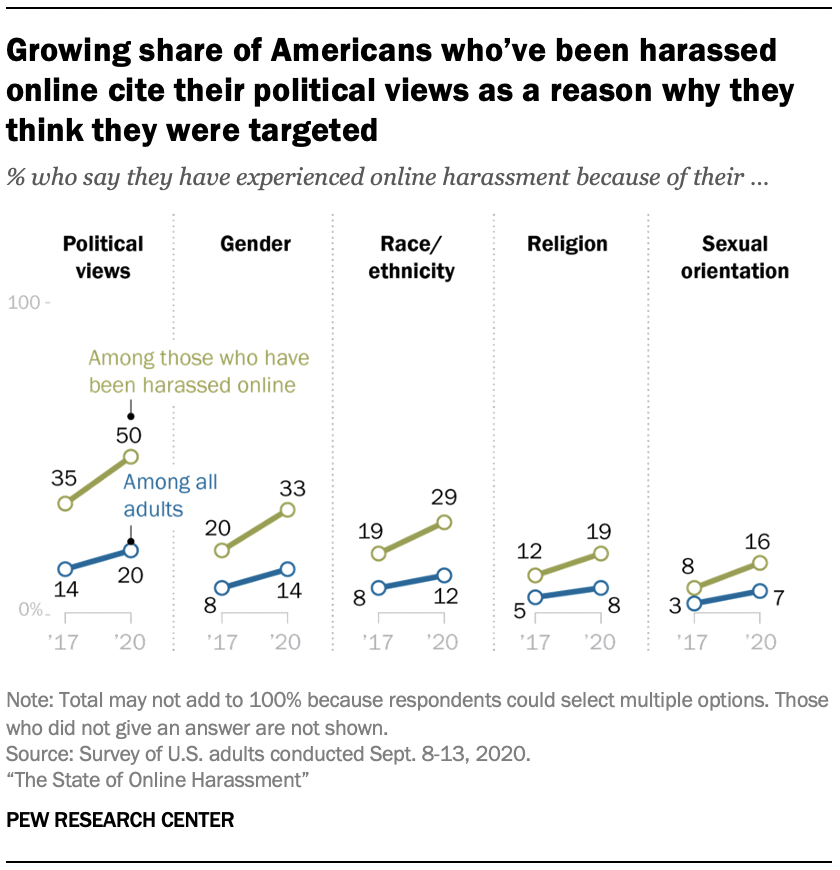
Those that were pressured have been then requested whether or not they believed positive non-public traits – political opinions, gender, race or ethnicity, faith or sexual orientation – performed a task within the assaults. Totally 20% of all adults – or 50% of on-line harassment goals – say they’ve been pressured on-line as a result of their political opinions. On the similar time, 14% of U.S. adults (33% of people that were pressured on-line) say they’ve been pressured in line with their gender, whilst 12% say this befell as a result of their race or ethnicity (29% of on-line harassment goals). Smaller stocks level to their faith or their sexual orientation as a explanation why for his or her harassment.
Every of those causes has risen for the reason that Heart closing requested those questions in 2017. There were 6 proportion level will increase within the stocks of American citizens attributing their harassment to their political opinions in addition to gender. Race or ethnicity, sexual orientation and faith every noticed a modest upward thrust since 2017.
There are a number of demographic variations relating to who has been pressured on-line for his or her gender or their race or ethnicity. Amongst adults who’ve been pressured on-line, kind of part of ladies (47%) say they believe they’ve encountered harassment on-line as a result of their gender, while 18% of guys who’ve been pressured on-line say the similar. In a similar fashion, about part or extra Black (54%) or Hispanic on-line harassment goals (47%) say they have been pressured because of their race or ethnicity, when put next with 17% of White goals.
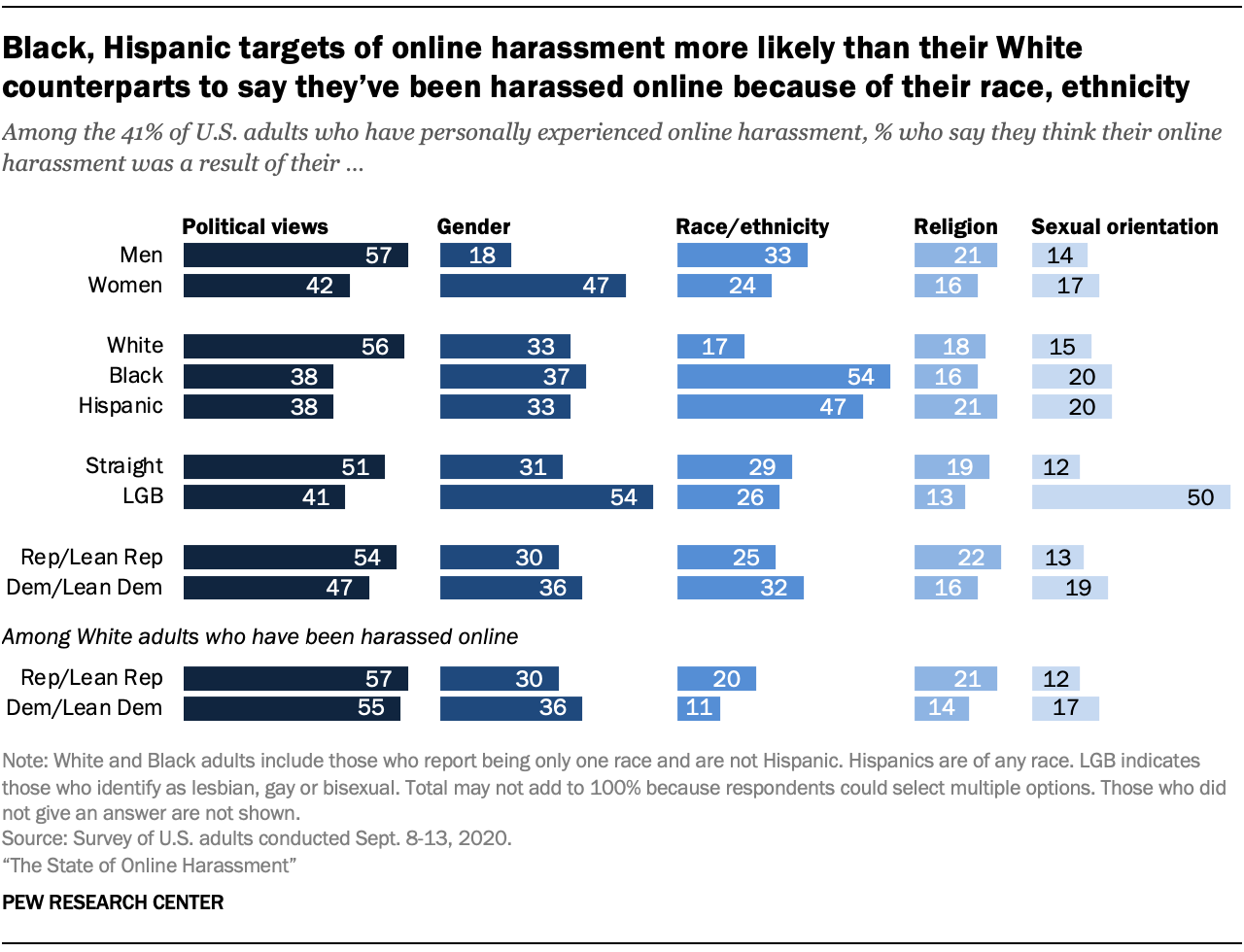
Whilst small stocks general say their harassment used to be because of their sexual orientation, 50% of lesbian, homosexual or bisexual adults who’ve been pressured on-line say they believe it befell as a result of their sexual orientation. Via comparability, best 12% of heterosexual on-line harassment goals say the similar. Lesbian, homosexual or bisexual on-line harassment goals also are much more likely to document having encountered harassment on-line as a result of their gender (54%) when put next with their directly opposite numbers (31%).
Males and White adults who’ve been pressured on-line are specifically more likely to say this harassment used to be a end result in their political opinions. Careworn males are a complete 15 proportion issues much more likely than their feminine opposite numbers to quote political opinions as the explanation they have been pressured on-line (57% vs. 42%). In a similar fashion, White on-line harassment goals are 18 issues much more likely than Black or Hispanic goals to indicate to their political opinions as the explanation they have been focused for abuse on-line.
And whilst there are some partisan variations in mentioning political opinions because the perceived catalyst for going through harassment, those variations don’t dangle when accounting for race and ethnicity. As an example, White Democrats and Republicans, together with independents who lean towards every respective birthday celebration, who’ve been pressured are about similarly more likely to say their political opinions have been the explanation they have been pressured (55% vs. 57%).
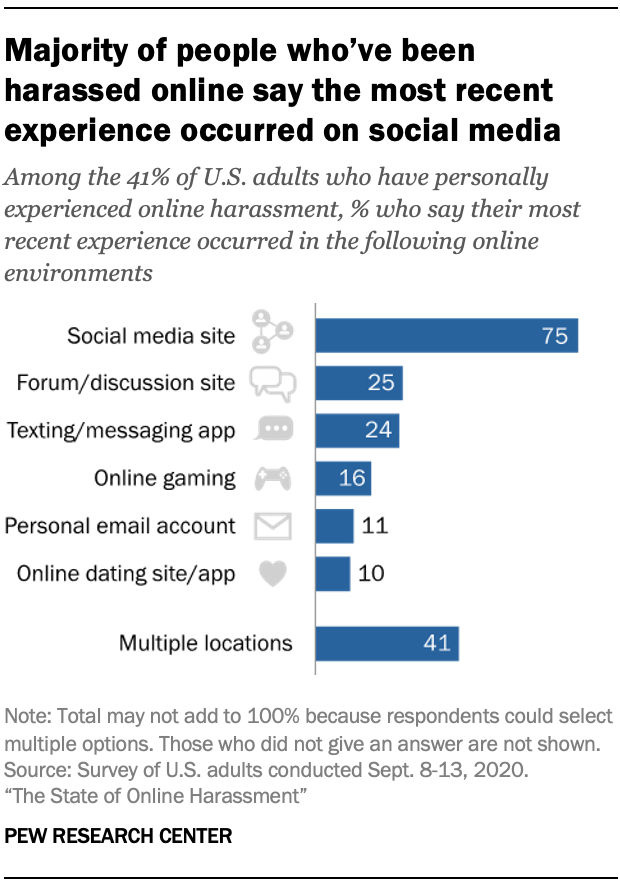
As used to be true in earlier Heart surveys about on-line harassment, social media proceed to be essentially the most frequently cited on-line venues the place harassment takes position. When requested the place their most up-to-date enjoy with on-line harassment befell, 75% of goals of this kind of abuse say it came about on social media.
Via comparability, a lot smaller stocks of this staff point out on-line boards or dialogue websites (25%) or texting or messaging apps (24%) as the positioning the place their most up-to-date enjoy befell, whilst about one-in-ten or extra cite on-line gaming, their non-public electronic mail account or a courting website online or app. In overall, 41% of goals of on-line harassment say their most up-to-date enjoy of harassment spanned multiple venue.
Whilst social media are essentially the most frequently cited on-line areas for each women and men to mention they’ve been pressured, ladies who’ve been pressured on-line are much more likely than males to mention their most up-to-date enjoy used to be on social media (a 13 proportion level hole). However, males are much more likely than ladies to document their most up-to-date enjoy befell whilst they have been the use of an internet discussion board or dialogue website online or whilst on-line gaming (each with a 13-point hole).
Whilst maximum American citizens really feel that harassment and bullying are an issue on-line, how one can deal with this factor stays up for debate. The insurance policies used to struggle harassment and the transparency in reporting how content material is being moderated range tremendously throughout on-line platforms. Social media firms were extremely criticized for his or her present ways in addressing harassment, with advocates announcing those firms will have to be doing extra.
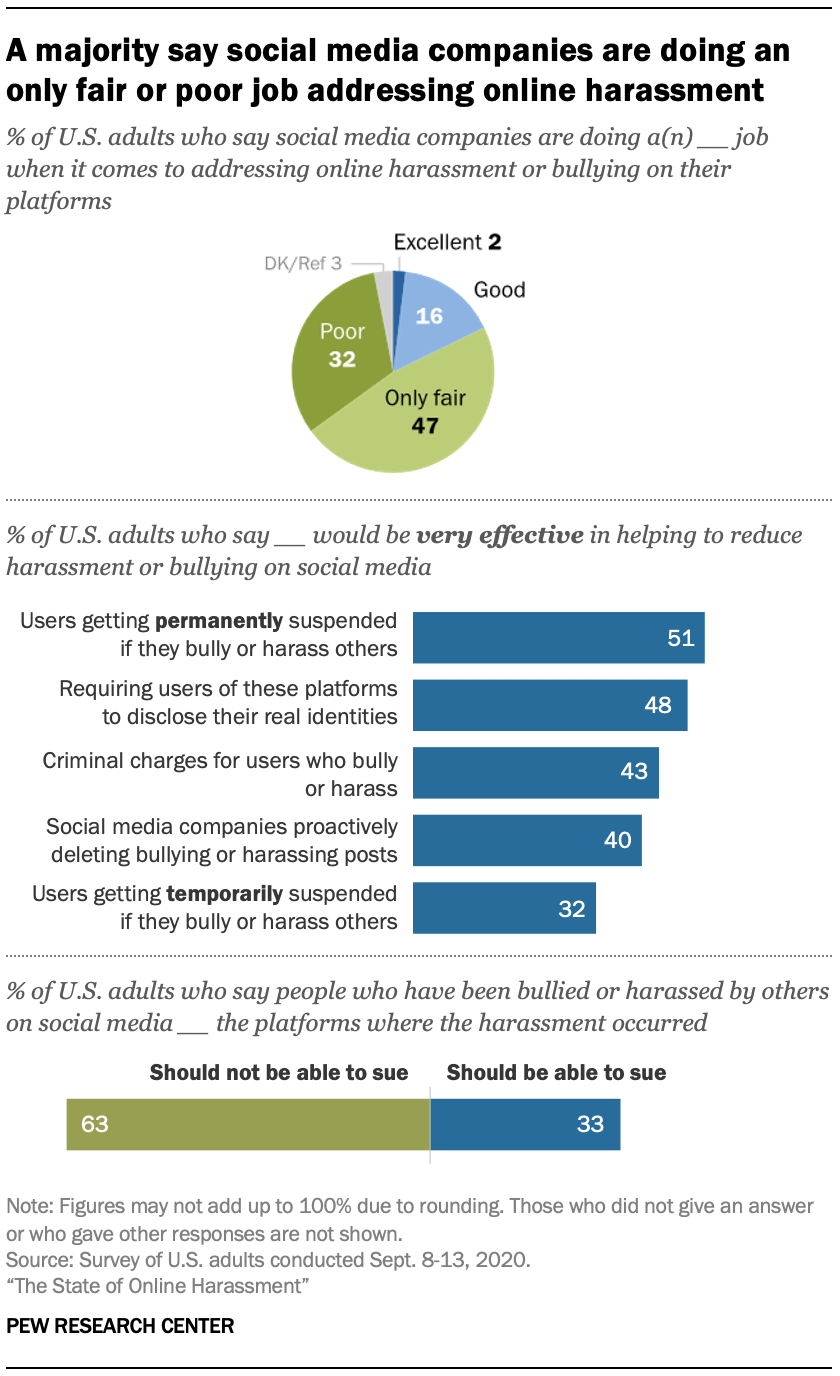
The general public is in a similar fashion crucial of social media firms. When requested to charge how neatly those firms are addressing on-line harassment or bullying on their platforms, simply 18% say social media firms are doing a very good or excellent task. A lot higher stocks – kind of eight-in-ten – say those firms are doing an best truthful or deficient task.
Regardless of maximum American citizens being crucial of the task social media firms are doing to deal with harassment, some are positive about quite a lot of conceivable answers requested about within the survey which may be enacted to struggle on-line harassment.
About part of American citizens say completely postponing customers in the event that they bully or harass others (51%) or requiring customers of those platforms to reveal their actual identities (48%) could be very efficient in serving to to scale back harassment or bullying on social media.
Round four-in-ten say prison fees for customers who bully or harass (43%) or social media firms proactively deleting bullying or harassing posts (40%) could be very efficient.
Transient bans are deemed the least efficient resolution about which respondents have been requested. A 3rd (32%) of American citizens say customers getting briefly suspended in the event that they bully or harass others could be an excessively efficient measure towards harassment. On the subject of preserving social media firms in control of the harassment on their platforms, few suppose non-public court cases will have to be the answer. A 3rd of adults say individuals who were bullied or pressured by way of others on social media will have to be capable to sue the platforms the place the harassment befell, while a miles higher proportion – 63% – consider goals of on-line abuse will have to now not be capable to deliver felony motion towards social media websites.
Supply Via https://www.pewresearch.org/web/2021/01/13/the-state-of-online-harassment/
